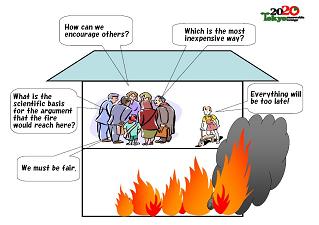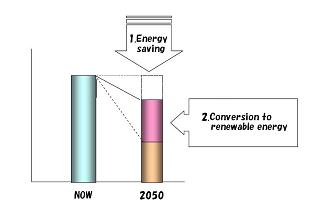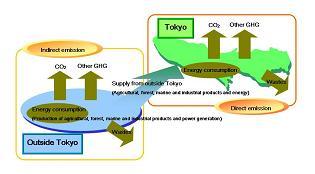ProjectsPast and current JFS projects
Tokyo's Pioneering Attempt - Toward Dramatic Increase in the Use of Renewable Energy
 Copyright JFS
Copyright JFS
What is the first priority we have to tackle to maintain sustainability? Isn't it to suppress global warming above all? Indeed, significant social change is required for this purpose, but it is more important to recognize that we do not have much time left. Let me mention today's conclusion now: be more conscious of government policies and be more involved in developing a mechanism of society to solve this problem. I feel that students today have almost no interest in policies. Majority of them try to seek what they can do in their everyday life like trash picking. To change a society, you have to change the mechanism of the society. To change the mechanism, I would like you to be more interested in policies and learn how to develop them.
Why sustainability?
The approach to sustainability today is fairly different from the one we had ten years ago; we have become aware of the limitations of unsustainable society. To be concrete, we now know part of the risks of climate change. Recently, United Nations Environment Programme (UNEP) announced that the average annual ice loss in mountain glaciers worldwide is three times the loss rate of the 1980s. The loss and its acceleration have been scientifically proved.
We are exposed to a risk which we have to find an answer to. Will trash picking help when we have to produce results in twenty years? Undoubtedly, fairness is an important element of sustainable society, but it has no meaning under the circumstances where the global environment human beings stand on is almost collapsing.
Approach to global warming prevention undertaken by the Japanese Government
The efforts undertaken by the Japanese Government are roughly divided into three categories; technological development, acceleration of voluntary efforts and transformation of life styles. Voluntary efforts may include "Keidanren Voluntary Action Plan on the Environment" and "Team -6%" promoted by the Ministry of the Environment. But, they are too much dependent on autonomy, only have low objectives and ensure no effectiveness.
Efforts to transform life styles may include a campaign of turning off electric appliances not in use and using a traditional reusable wrapping cloth. The Japanese tend to love this kind of approach but we are not quite sure how the cloth helps stop global warming. It is undeniable that we are self-satisfied with doing what we can do only.
Technological development is advancing, for sure. But technology is meaningful only when it is used. The nations that are most successful in the way of sustainability are not always the ones with most advanced technologies. They are the ones most utilizing the mechanism of society. Japan's efforts today seem less enthusiastic about changing the mechanism.
Developing government policies
Mini Workshop
"You are going to work out a policy to suppress global warming in twenty years. First, develop a policy by yourself. Next, form a group with several colleagues, discuss all policies you have and reach an agreement as a team. Hurry and agree in stipulated time limit, as the earth is collapsing."
Each group submitted its agreed policy. Students voted by a show of hands and adopted a plan of limiting the consumption of underground resources, attaching a label that describes the LCA of the raw materials on a product and reducing the gross volume of large-scale economic activities to 80 percent in three years. Some group could not present a plan in given time limit.
It must be a difficult task to work out a policy in a limited time. I would like you to learn that consensus building required time. Needless to say, the concrete contents of the policy are important but we are forced to reach an agreement or develop a policy in a limited time in the real world. It is meaningful to produce results even under such circumstances.
It is obvious that everything will be too late, when the fire is spreading, if you discuss how fire fighting can be fair or if there is a scientific basis in the argument that fire reaches to this point or not. The same thing can be said when thinking out preventive measures against global warming. The earth cannot wait until you devise a measure if you take too much time for discussion. It is important to have this sense of time.
Global policies from municipalities
The Tokyo Metropolitan Government aims at pushing up the ratio of renewable energy in its total energy consumption to approximately 20 percent by 2020. The Law Concerning the Promotion of the Measures to Cope with Global Warming stipulates that the role of local governments is to promote policies to limit GHG emissions in accordance with the natural and social conditions of their areas, to limit GHG emissions in their own business activities and to adopt other measures so that enterprises and residents in their areas are encouraged to take activities to limit GHG emissions. The target of Tokyo is far beyond the intension of the law.
When facing a risk of the global scale, i.e. global warming, no definite boundaries can be fixed between the roles of the national government and the local governments. Our belief is that the local government should take an action, when the national government is hard to take steps. This movement can be seen in any part of the world and it can be said to have become a world trend.
A big issue like global warming needs to be cross-sectionally tackled by multiple organizations or divisions. However, a national government has vertically divided administrative functions and this inhibits cross-sectional approach covering multiple ministries and agencies and therefore cross-sectional packaged policies. On the contrary, Tokyo as a local government is more flexible to devise an effective mix of policies.
What Tokyo aims at
Why should we promote renewable energy now? It goes without saying that energy must be saved. We, however, cannot live without energy. Therefore, we need to shift to renewable energy.
One of the reasons why we need significant shift is that even a slight temperature rise may exert considerable influence on an ecological system and people's lives. Some fragile ecological systems have already been influenced. If the earth became warmer by two degrees Celsius, it will trigger increase in the number of heat strokes and large typhoons and thus its negative influence will expand on a global scale. It is said that the risk of disrupting an ecosystem and people's lives would dramatically increase.
We must prevent the global temperature from rising by more than two degrees Celsius at any cost. To achieve this target, we must reduce global GHG emissions to 50 percent below our 1990 levels by 2050. The developed nations composing only 20 percent of the global population consume 80 percent of the total energy. It is unavoidable for developing nations to emit more gas, if they want to raise their basic living standards. Counting in such factors, the developed nations need to reduce by 80 to 90 percent.
To avoid climate change of dangerous level, Tokyo set, in its Tokyo Renewable Energy Strategy, a very high goal of 20 percent increase in the ratio of renewable energy by 2020. It used an example from the EU that published a figure of 60 to 80 percent reduction in GHG emissions compared to 1990, based on the principle of back casting. Tokyo intends to keep pace with developed nations and regions worldwide and to enhance the global trend to expand the use of renewable energy.
Three approaches to achieve the target
Many of the industrial, agricultural and marine products supporting the activities of the giant metropolis Tokyo are supplied from outside the city. If we include these, the total amount of CO2 emission caused by the activities of the city is even huger. In this context, Tokyo is a consumer giant. If the city leverages the position as a consumer, it can create demand for renewable energy. The size of the demand can be used to expand the supply of the nation. The first approach is creation of demand.
The second approach is to promote the way of use that takes advantage of the characteristics as natural energy. The third is to enable individuals and regions to choose which energy they use. Small-scaled and widely distributed, renewable energy has an advantage of flexibility; individuals and regions can choose the type of energy they use. They can be powerful consumers, as they have the option. They can be energy suppliers as well, if they are equipped with a photovoltaic power generating system.
Tokyo does not try to distribute each of such systems one by one but want to make them a package, expecting synergistic effects of producing more than just a sum of its components.
Creating a mechanism for expansion of use
To expand the use, a mechanism to demonstrate the existence of the project is wanted. What kind of mechanism is most appropriate? An example is green procurement of electricity. Tokyo pioneered in introducing a system in 2004, where large-scale facilities of the municipal government would purchase five percent or more renewable energy for electricity they used. They demanded that at least five percent of electricity suppliers supplied must be renewable energy. If we collaborate with each other, we will be able to far exceed the easy targets of the RPS Act.
We are going to invite municipal governments and businesses in other regions to this mechanism.* This kind of movement first starts at an individual level, then a new movement is independently born in each region and it will be upgraded to the national level. If there were some thoughtful staff members in each municipal government, they could break the ice and change the mechanism of society.
Even if we are committed to change the mechanism of society with a lofty goal, such commitment will not be accepted from the first. We need to develop a strategy, for example, of carrying out experiments first and making it obligatory when diffusion rate exceeds 30 percent. It is also important to transmit information about such efforts to the rest of the world.
This type of approach based on a lofty goal is very difficult to realize in actuality. Fortunately, however, Tokyo has brought good results. Its unique approach to reduce air pollution was adopted by the national government. It once achieved a dramatic result in terms of control on exhaust emissions from diesel vehicles. This experience encourages us and helps us believe nothing is impossible. Human beings are the cause of global warming. Therefore, we should be able to stop it.
How can we build a mechanism of a society?
The mission of our generation is, at least, not to have the next generation repay the debts. If this trend continued, we would leave terrible debt. On the other hand, we have no time left. For this reason, we need effective policies and new mechanism that can bring about results within a limited time.
Effective learning and thinking are essential to build such effective mechanism and policies. Leaning means imitating in the first place. As long as we are tackling one of the most difficult issues, we need the latest information of the highest level. We would choose the most appropriate information from every part of the world and ask the most appropriate persons for instruction. Learning would be meaningful, only when you put what you had learned into practice. In terms of sustainability, we urge your action, while facing up to the reality.
* This lecture was given on March 23, 2007.
Profile
Mr. Taniguchi is the Deputy Director of Planning Section, General Affairs Division, Bureau of Environment of Tokyo Metropolitan Government. He works on the promotion of renewable energy and energy-saving home appliances as well as collaborations with NGOs. For example, he is involved in a wind power generation project of the TMG from the planning phase until implementation. He also takes part in an NGO.





